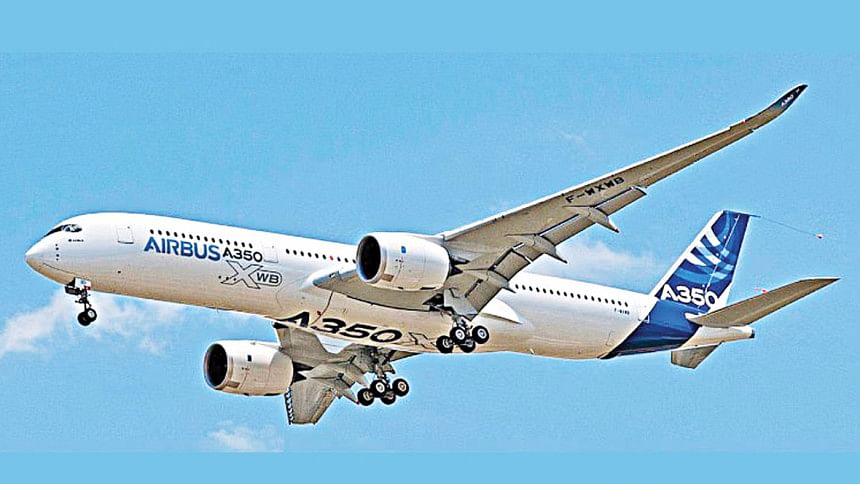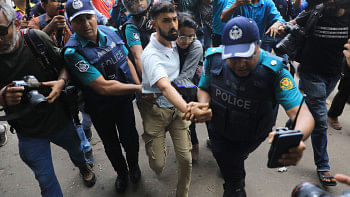Biman short of cash, yet reaches for pricey Airbus

Biman is looking at a Tk 4,000 crore cash shortfall since it has agreed in principle to purchase two Airbus planes for Tk 8,000 crore, without a prior monetisation plan, a board meeting of the national flag carrier revealed.
The board in a meeting asked Biman to figure out how to make the new planes profitable, while an MoU between Airbus and Biman is being drafted amid diplomatic pressures.
A Boeing offer has been on the table for months but it is yet to be taken up for evaluation.
Biman board member Rear Admiral (retd) Md Khurshed Alam, said, "The Tk 4,000 crore shortfall is only a very initial estimate and this can change depending on how we reevaluate."
State Minister of the Ministry of Civil Aviation Md Mahbub Ali said at the November 15 meeting that Biman agreed to buy Airbus planes in principle to handle a mix of diplomatic relations and Biman's commercial interests.
"The French president had hoped to sign a memorandum of understanding during his visit to Bangladesh. Similarly, when Prime Minister Sheikh Hasina visited the European Union, they asked for the process to be expedited. The other EU countries are also interested in seeing this happen. Rushnara Ali [British parliamentarian from Bethnal Green] had also paid a visit," said the minister.
The MoU would be binding and involve a non-refundable $10 million commitment fee for two planes, according to the Airbus sales proposal seen by The Daily Star.
"We have agreed to buy the planes because no airlines should be dependent on one aircraft manufacturer only. There is a high demand among passengers for the Toronto and Narita flights and we need to expand the fleet for that," he said. "But we are determined to do this right and will take the time to do so."
During French President Emmanuel Macron's September visit to Dhaka, State Minister Mahbub said Bangladesh has committed to buy 10 Airbus planes. On May 5, a joint communique was signed by United Kingdom's Minister of State in the Department for Business and Trade Lord Dominic Johnson and Private Industry and Investment Adviser to Prime Minister Sheikh Hasina Salman F Rahman in London regarding the purchase of eight Airbus A350s and two freighters.
"The Tk 4,000 crore shortfall is only a very initial estimate and this can change depending on how we reevaluate."
But all of this happened even before Biman carried out a viability study on such a purchase – the techno-financial team was formed after the decision to buy Airbus planes was made.
Biman board on May 3, decided that the purchase of planes could only happen after a technical and financial evaluation. The board did not insist on a particular airframe maker, saying, "Up to eight Rolls-Royce powered A350-900/1000 aircraft (the "A350 Pax Aircraft") or any other suitable aircraft (wider or narrow) as per Biman's requirement".
The joint communique was signed two days later.
The proposed first purchase will consist of two A350-900s, to be delivered in 2026 and 2027. Biman must make $100 million in pre-delivery payments for the two planes. At least $30 million of it must be handed over during deal signing and the rest over the following 30 months, according to the Airbus proposal.
If Biman buys these planes, and commits to buying eight more, they will get up to $434 million in credit for other Airbus products and services, according to the Airbus proposal.
Biman's techno-financial committee is still figuring out how to raise funds to purchase the planes. They would also be planning the routes, and estimating the fuel burn, maintenance costs, revenue earnings, and figuring out whether the revenue would be enough to cover the instalments for the new planes.
The committee is not doing a comparative analysis between Airbus and Boeing's offers.
BIMAN'S OUTSTANDING LOANS
Biman is planning to buy Airbus aircraft when it has not paid off loans for most of the planes in its fleet.
Of its 21 planes, Biman fully owns four, two short-haul De Havilland Canada Dash 8-400s and two Boeing 737-800s. It is set to pay off the loans for two Boeing 777-300ERs which joined the fleet in 2011.
Biman has so far paid off about half of what it owes to aircraft manufacturers for purchases between 2011 and 2021.
The carrier has about Tk 8,534 crore in outstanding loans according to data obtained from Biman. For most of its planes, over 60 percent of the loans are yet to be paid off, according to documents.
Biman would be paying Tk 8,401 for the two A350-900s alone. It will need to spend more on setting up a wholly separate management system for the A350s, including hangars, sets of pilots, cabin crew, maintenance engineers, and ground service providers.
Biman is yet to calculate how much it would cost to set up this new system but Airbus's rival Boeing in October claimed that the costs of transition would exceed $146 million.
This cost of transition into a mixed fleet involves purchases of equipment, spares, and training. Sources said Biman would need to spend an additional $61.77 million just on spare engines, parts, and equipment.
According to the Airbus proposal, 80 percent of the financing will be arranged by the export credit agencies concerned of Airbus. Biman will have to borrow the other 20 percent from banks.
The $550 million with which Biman bought the five planes between 2019 and 2021 came from the country's reserves. Biman is yet to return that money. Three Dash-8s and two Boeing 787-9s were bought.
Biman is eying new planes when the ones already in its fleet are underutilised.
To make the carrier's long-haul planes -- the Boeing 777s and 787s -- economically viable, they should be in the air for at least 15 hours a day, highly-placed Biman sources said.
Biman's aircraft utilisation data from June to October this year obtained by The Daily Star shows that the highest per day use was achieved with two Boeing 787-9s -- 12.43 hours.
The six Boeing 737-800s flew less than 10 hours a day, while the Boeing 777s and 787-8s flew a little over 11 hours a day.
The five short-haul Dash-8s flew the least, only 6.27 hours a day.
McKinsey & Company, one of the leading management consultation agencies in the world, which has provided business strategies to over 21 global aerospace companies, wrote in a 2022 article, "Regardless of aircraft type, airlines that buy newer, more expensive aircraft will have to manage the large weight on their balance sheets by maximizing utilisation. Ideally, new planes should be in the air for 10 to 12 hours a day for narrow bodies and 14 to 15 hours a day for wide bodies."
The Boeing 777s and 787s are wide-body planes while the Boeing 737s are considered narrow-body.
Biman officials, choosing to be anonymous, said the fleet was being underutilised because there is an acute shortage of cockpit crew.
If Biman had a mixed fleet, the cockpit crew crisis would have worsened, said Biman insiders with knowledge of crew planning.
If Biman sets aside two pilots for the A350s, they would be ready to fly by the end of 2027. But the first Airbus will be delivered in 2026.
Airbus in its sales proposal said it would train six sets of cockpit and six sets of cabin crew members for each aircraft and that the training would start a year before delivery and end a year after.
Antonio da Costa, vice president of marketing for Airbus, told The Daily Star that this [buying airbus planes] would be an investment in the long run. "When Bangladesh buys A350s, pilots will be trained to operate those. Later, if the country buys A320s or any other aircraft of Airbus, the same pilots would be able to fly those aircraft with a 10-day training," he said.
All Airbus aircraft cockpits have the same interface, he said.
"Training a pilot to fly B787s [Boeing 787s] and then again to fly B777s [Boeing 777s] comes with a significant cost penalty."
In September, The Daily Star reported that only four out of Biman's engineering staff of 60 had partial training to work on A350s.
If Biman chooses to train the existing force, it would need about five years to complete the training, said engineers of Biman. Airbus offered two years of maintenance training in its sales proposal.
Airbus's sales proposal also mandates that the planes will be powered by Rolls Royce engines.
Biman does not use Rolls Royce engines in its planes. All its Boeings are powered by GE (General Electric) and CFM International engines, while the Dash-8s are powered by Pratt & Whitney engines.
Airbus's proposal is being evaluated on the basis that Dhaka-New York flights will resume in future.
Biman had operated flights to New York between 1993 and 2006. The US Federal Aviation Authority downgraded Civil Aviation Authority Bangladesh after finding irregularities in its operational activities in an investigation in 2006. It said CAAB did not adhere to International Civil Aviation Organisation standards.
MA Momen, the former managing director of Biman, who first introduced Boeing aircraft during the the last caretaker government, describes how Bangladesh became Boeing-dependent. "When I joined in 2006, I was to somehow make Biman survive with its huge debt. We had four fuel guzzling DC10s, which were often grounded, three Airbus 310-300s of which two were on dry lease and one functional F28. The fleet was more a liability than an asset.
"Both Boeing and Airbus came forward with their product plans. After several presentations and discussions, the board gave a nod to Boeing. But before finalising the deal, the commercial aspects were thoroughly examined by KPMG and IBA of Dhaka University," he said.
He said Biman chose Boeing notwithstanding the fact that the cockpit crew would need to be retrained.
Biman is now a profit-making carrier, having cleared a profit of Tk 439 crores in the last fiscal year, up from Tk 158 crore the year before.
"All these started happening 18 years ago. But the very basic business rule remains the same. A mixed fleet is generally recommended when the airline is really big. Otherwise, it is not cost-effective. Treat Biman as a commercial organisation, not a charitable one and go for an appropriate cost-benefit analysis. If the result is positive in the short and long run, there is no harm in going with a mixed fleet. If it is not, please do not harm the airline," he said.

 For all latest news, follow The Daily Star's Google News channel.
For all latest news, follow The Daily Star's Google News channel. 



Comments